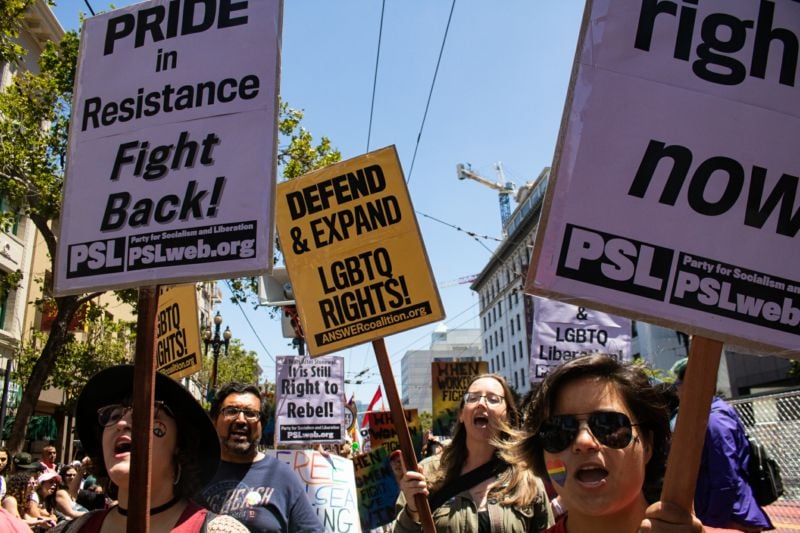Hungary’s racist, homophobic, transphobic right-wing government has continued its efforts to divide the Hungarian working class by depriving transgender and intersex people of their right to legally change their genders. Across the capitalist world, LGBTQ rights have become a major target of attack by reactionaries, making it more imperative than ever that the working class rally in their defense.
On May 19, the Hungarian Parliament passed a new omnibus bill that bans transgender or intersex people from legally changing their gender, just the latest attack by far-right forces aiming to firmly cement the rule of the capitalist class.
Article 33 of the new bill amends the Hungarian civil registry document – the basis of all legal identity documents – so that they record “sex assigned at birth” instead of merely “sex,” leaving no room for a later amendment by people whose identity does not match the one picked for them when they were not capable of articulating it themselves. This reverses a gain won just two years ago.
Without this right, trans people are automatically forced to “out” themselves every time they show their ID, greatly increasing their risk of discrimination and violence, and intersex people have no opportunity to decide how they wish to move through the world.
“People who haven’t had suicidal thoughts for decades now are having them,” Tina Korlos Orban, vice president of advocacy group Transvanilla Transgender Association, told Reuters. “People are in panic, people want to escape from Hungary to somewhere else where they can get their gender recognized.”
Marriage equality has also come under attack under the right-wing government of Viktor Orban, who became prime minister in 2010 and who has said “morally, there is no difference” between pedophiles and same-gender couples who want to adopt children. The new constitution, adopted in 2011, explicitly defines marriage as between a man and a woman.
Rise of the far right
Orban’s Fidesz Party got its start in 1988 during the anti-communist upsurge that destroyed the socialist government the following year, and has formed an outright majority in parliament since 2010, when its alliance with the right-wing Christian Democratic People’s Party triumphed. As in much of the rest of Europe and the United States, the far right in Hungary has fostered anti-migrant racism as a way to divide working people against each other by demonizing migrants as a threat to the nation, thereby intimidating workers into rallying around “their own” government instead of standing in solidarity with struggling members of their class.
In Hungary, this racist ideology has been weaponized not only against refugees fleeing from imperialist wars in Syria and Libya, but also Jews and Roma, and extended to LGBTQ people by identifying low birth rates as a threat to the Hungarian nation.
The far-right in Hungary has long used the LGBTQ community as an ideological punching bag for their “family first” posturing and have staged attacks on Pride events for years. Budapest Pride is the oldest and one of the largest Pride events in the former Eastern Bloc, and has seen major counter-protests since 2006, with some 500 ultra-nationalists led by the fascist group Jobbik in 2007 chanting “Queers into the Danube, Jews after them!” as they attacked the parade with bottles, sandbags and other projectiles.
The symbolism of the chant is unmistakable: the monument “Shoes on the Danube Bank” had been built on the embankment near the parliament building just two years earlier to commemorate roughly 20,000 Jews who were executed there by the fascist Arrow Cross Party that ruled Hungary during World War II.
The socialist Hungarian People’s Republic that arose after the overthrow of fascism at the end of the war was an early leader in gay rights, decriminalizing homosexuality in 1961, with several other socialist nations soon following suit. In the United States, by contrast, same-gender love was not decriminalized nationwide until 2003.
Hungary isn’t the only former socialist nation where the restoration of capitalism unharnessed far-right bigotries: in Poland, one-third of municipalities have declared themselves “free of LGBTI ideology,” constituting an area larger than Hungary. As in Hungary, Poland’s socialist government was attacked by fascists in the 1980s for its tolerance of the gay community.
In Hungary as in the United States, the attacks on trans rights are just another way by which the ruling class tries keeping working and oppressed people from uniting against the system that oppresses and exploits them. Socialist movements have long led the fight against all forms of oppression, including transphobia by emphasizing our unity as well as our unique struggles. As the far right grows bolder and more empowered, the need for us to close ranks around those under attacks is greater than ever.






